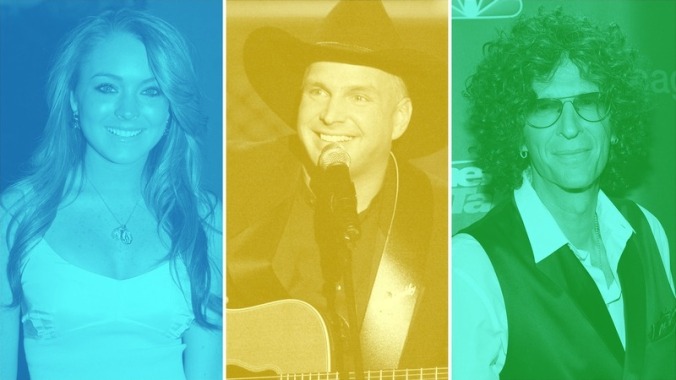What artist you dislike made something you love?


This week’s question comes from A.V. Club contributor Mike Vago:
“Like any decent person, I don’t like the Black Crowes. Derivative frat-boy rock, sexist album covers, and I can’t prove this, but I’m convinced singer Chris Robinson is somehow responsible for ex-wife Kate Hudson squandering the promise she showed in Almost Famous on bland romantic comedies. So, the Black Crowes are terrible. And yet. Their second album, The Southern Harmony And Musical Companion, is a goddamned masterpiece, and I will fight anyone who says otherwise. So, my question is this: What artist you hate produced a work of art you love?”
No matter how many times I’ve tried, I’ve never been able to get into Aimee Mann. On the surface, it seems like an easy sell (which is probably why I kept giving it shot after shot for so long): Rich, grainy voice; wandering, guitar-based art-pop songcraft; general weirdo vibe. But something about her music just never connected with me, perhaps becasue it mostly sounds far too genteel and easy-listening for my taste. But I would encounter it everywhere, and by the time it suffused all of Magnolia like a sodden blanket, it started to actively irritate me. Nonetheless, despite my aversion to the overwhelming majority of her discography, she has one tune that I unabashedly love: “Pavlov’s Bell,” the song she plays during her guest appearance in the final season of Buffy The Vampire Slayer. For once, that melange of folksy, gentle rock and brainy lyricism came together perfectly, and drew me in. The song has been in regular rotation on just about any playlist I’ve made in the past decade-plus, and I could recreate not just the vocals, but probably each individual instrument, from memory. Every couple of years, I find myself listening to it and thinking, “Maybe I should give her another try.” In fact, I’ll do it right now… nope, still not for me.
I’ve never been able to get behind Lady Gaga. Not only does she continually co-opt others’ cultures or artistry and expect to be celebrated for it, but she uses her manufactured “monstrosity” to sell embarrassingly rote, forgettable pop songs. And maybe most abhorrent is her outsize ego. Still, there’s one single performance that keeps me from writing her off forever. In her 2014 PBS concert special alongside Tony Bennett, she seems to set aside most of those things for a truly electrifying rendition of “Bang Bang (My Baby Shot Me Down).” Sure, she comes out in the Cher wig and the red leather suit—yet another costume—but Gaga the concept and Gaga the talent coalesce on that stage, and she throws herself completely behind a cover that pays appropriate homage to—and dare I say sets a new bar for—that oft-covered Sonny Bono original. Gaga’s affect is probably too far gone for any change to win me back, but if she showed this side more often, I’d be forced to tune in.
It pains me to say this, given that he wrote Wanted—a top contender on my list of the nastiest, least pleasant comics of all time—but I still get a kick out of the work Mark Millar did on Marvel’s Ultimate Universe, especially early on. His Ultimates is the dumb kind of satire that still appeals to me, a comic that once had its neocon Captain America loudly demand of an enemy asking for his surrender, “You think this letter on my head stands for France?” That’s so over-the-top that I can’t help but admire it, especially when it’s mixed with action scenes taking full advantage of Bryan Hitch’s widescreen action-movie aesthetic, or a post-9/11 conception of characters like The Hulk as one-man weapons of mass destruction. Plus, any comic that birthed the idea of Samuel L. Jackson as Nick Fury into the world is worth celebrating, no matter who wrote it.
“Hate” is always such a strong word, but let’s just say I’ve never really cared for Howard Stern. Particularly in his early-’90s “King Of All Media” heyday, when I would catch bits of his E! show, I just found his whole persona grating, and pandering to the dumbest kind of “Yeah, Stern baby!”-shouting shithead—his constant fixation on telling his female guests how hot they were; the fart jokes; assembling a bunch of racist, disabled, or otherwise impaired people to be his “Wack Pack”; etc. So I was surprised at how much I enjoyed Private Parts, the 1997 movie that managed to humanize Stern and put that persona in perspective. It portrays him as an intelligent, complex guy who understands and genuinely loves his audience—even though he knows his character isn’t always something to be proud of, even as he fights to protect it. (Casting Paul Giamatti as the oily “Pig Vomit” was a masterstroke in that regard, Giamatti’s splenetic rage making Stern’s crusade to keep having strippers on his show seem downright noble.) While I recognize that these days Stern has matured somewhat—and developed into one of the most effective interviewers of our time—I still don’t listen to his show, and I instinctually look askance at anyone who asks me if I “heard Stern today.” Still, anytime I catch his movie on cable, I’m compelled to watch it. If that Howard Stern showed up more often, I might be a bigger fan.
Zack Snyder’s movies are turgid, self-serious messes that confuse constipated grimaces for maturity, and that would be seven minutes long if he just did away with the slow motion. He tried something different with Sucker Punch, to date his one non-licensed or rebooted film. Granted, it’s a mess, and his brand of feminism is a fucked-up, sexually exploitative martyr complex, so I can’t even say I like the movie. But I really love the scene where the protagonist Babydoll fights a trio of 20-foot-tall samurai. It’s the kind of gonzo fantasy that I wish more movies would embrace, and the whole scene is reminiscent of the dream sequence from the superior-in-every-way Brazil. Then again, even parts of that fight scene drag under the floaty CGI of it all, and Babydoll’s multiple gratuitous panty shots are dumb. There is a part of the scene though, where one of the samurai storms into the temple wielding a massive Edo-period-designed Gatling gun, and it’s really rad! So, out of Snyder’s entire career, I unapologetically love those 2,880 frames.
Like most people, I was rooting for Lindsay Lohan’s acting career, a genuinely promising thing back in the early 2000s. I wasn’t, however, enough of a fan that I supported her insipid play for music stardom. In fact, you won’t really see me defending that nonsense from anyone. (I see you people who think Paris Hilton’s “Stars Are Blind” is a masterpiece.) But here’s where I fess up: I still sometimes listen to “Ultimate” from the Freaky Friday soundtrack, a song performed by Lohan. This track is cheesy as all hell, but it has a great hook, one that I long to sing at karaoke one day should it ever be available. If you’ll recall, the band in the movie was supposed to be a sort of pop-punk outfit—Lohan’s character dressed like Avril Lavigne-lite, which is saying something—so the tune has just a hint of that. Maybe it’s just the nostalgia, but I adore it.
Hate is the operative word when it comes to chest-pounding splat boy Eli Roth, a one-trick pony whose one trick is expressing total contempt for everyone on screen, the butchers and the butchered alike. It’s only when Roth is playing homage to his B-movie influences that a glimmer of affection shines through. Maybe that’s why I adore “Thanksgiving,” the fake trailer he made for Quentin Tarantino and Robert Rodriguez’s throwback double bill, Grindhouse: It’s nothing but homage—a spot-on parody of every low-budget, holiday-themed slasher that sliced and diced its way into theaters in the early 1980s. Roth gets all the details just right: the clumsy killer’s-POV shots; the baritone trailer voice, dropping punny taglines (“White meat. Dark meat. All will be carved.”); just the general, cruddy look of those disposable Friday The 13th wannabes. “Thanksgiving” twists Roth’s taste for gratuitous violence into wicked comedy, preserving the gore while losing all the tedious, look-at-these-ugly-Americans setup that sinks his features like a stone. The writer-director has promised that he’ll one day make “Thanksgiving” into a real movie. Why bother? We’ve seen the best kills already. Besides, two and a half minutes is really the ideal length for an Eli Roth project.
It might be a bit of an exaggeration to say that I hate Garth Brooks. He’s kind of too purposefully bland and inoffensive to inspire that level of vitriol. I try to save the word “hate” for people who deserve it, like Joe Eszterhas and the president. But I can say with some certainty that I strongly dislike the man’s work. He rocketed to Eagles-level superstardom through Eagles-style country-pop shittiness in the 1990s by taking country music out of the honky tonks and into suburban Walmarts, but if his work is overwhelmingly overproduced mediocrity, he gave the world one legitimate gift in the form of “Friends In Low Places.” Despite my disdain for Brooks, I cannot deny that it is just a straight-up great country song: funny; insanely, insanely catchy; full of rascally humor and underdog attitude. It’s not just good, it’s an all-time classic from a dude whose legacy is otherwise overwhelmingly negative. Could someone like George Strait do a much better job with the song, not to mention hundreds of others? Of course. But Brooks was the guy who made the song an instant standard. There’s no taking that away from him.
In general, I avoid artists I don’t like or merely shrug at their supposed lack of talent or ill-advised opinions or actions. That includes lifestyle-website-hawking, macrobiotic-eating cookbook author and actor Gwyneth Paltrow. Rather than inducing ire, Paltrow has become, to me, somewhat silly and self-important over the years, having developed a habit of saying ridiculous, tone-deaf things that demonstrate how out of touch she is with most people living in this country. At some point, she also seems to have lost her ability to act (I once watched 2010’s Country Strong on a plane on mute. The best part is when her character dies). But before she began blissfully shilling her own “mystical” perfume, I remember being impressed by her early work. In particular, I still love the way her Margot’s depressed deadpan reveals a deeper hurt in The Royal Tenenbaums. There was something natural and graceful about her craft, like she didn’t worry too much about what people thought of her, unlike today. And while Paltrow’s acting may no longer excite me, it should be noted, she makes really good salad dressing.
Join the discussion...